情态动词详细讲解
情态动词讲解归纳

链接中考语法:情态动词一、情态动词的特点:情态动词,又叫情态助动词。
它们具有以下特点:⑴它们必须与其他动词连用,即:情态动词+动词原形,表示说话人对所述动作的看法,如需要、可能、意愿或怀疑等。
⑵绝大多数情态动词没有人称和数的变化,即第三人称单数不加-s (以be和have开头的情态动词短语除外)。
⑶在意义上,情态动词具有“多义性”。
例如:can既可表示能力,又可表示可能、允许等意义。
二、部分情态动词的基本用法:1.can的基本用法:⑴表示体力或智力上的能力,即“能够,会”,可与beableto转换。
例如:HecanspeakEnglish./HeisabletospeakEnglish.?他会讲英语。
Canyouplaybasketball? —No,I can’t.?你会打篮球吗?——我不会。
如果表示将来具备的能力,要用willbeableto。
例如:IfIhaveagoodsleep,Iwillbeabletodotheproblem.?假如我睡个好觉,我就能做那道题目了。
⑵表示许可,主要用于口语,书面语一般用may。
例如:Canwegohomenow,please? —No,youcan’t.?我们可以现在就回家吗?——不可以。
Youcanonlysmokeinthisroom.?你只能在这间房间里抽烟。
You can’t keepthelibrarybooksformorethanamonth.?图书馆的书借期不可超过一个月。
⑶表示“可能”,与may同义,但一般用在疑问句中。
例如:Whatcanhepossiblywant?他可能会想要什么呢?另外,在否定句中,否定形式can’t表示推测“不大可能”。
例如:Anybodycanmakemistakes.?任何人都可能会犯错误。
Thenews can’t betrue.?那消息不大可能是真的。
与第一、二人称连用时,还可以就可能的解决问题的方式或可能的行为提出建议。
常见情态动词讲解
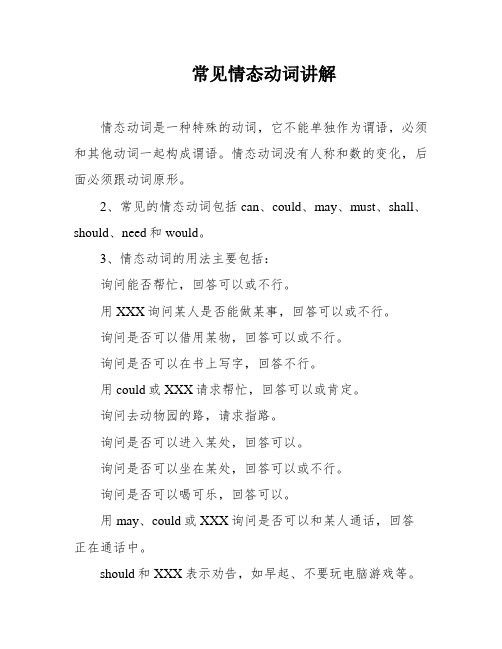
常见情态动词讲解情态动词是一种特殊的动词,它不能单独作为谓语,必须和其他动词一起构成谓语。
情态动词没有人称和数的变化,后面必须跟动词原形。
2、常见的情态动词包括can、could、may、must、shall、should、need和would。
3、情态动词的用法主要包括:询问能否帮忙,回答可以或不行。
用XXX询问某人是否能做某事,回答可以或不行。
询问是否可以借用某物,回答可以或不行。
询问是否可以在书上写字,回答不行。
用could或XXX请求帮忙,回答可以或肯定。
询问去动物园的路,请求指路。
询问是否可以进入某处,回答可以。
询问是否可以坐在某处,回答可以或不行。
询问是否可以喝可乐,回答可以。
用may、could或XXX询问是否可以和某人通话,回答正在通话中。
should和XXX表示劝告,如早起、不要玩电脑游戏等。
用should询问某人是否应该做某事,回答肯定或否定。
表示建议时可以用“你愿意…吗”来引导。
He said it was okay for me to smoke in the room。
Instead of using "may" to answer ns。
it's better to use phrases like "Yes。
please," "Certainly," "Please don't," "You'd better not," or "No。
you mustn't" XXX。
He might be at home。
but I'm not sure。
She may not be aware of this matter。
They could be having a meeting。
but I'm uncertain。
高中情态动词讲解
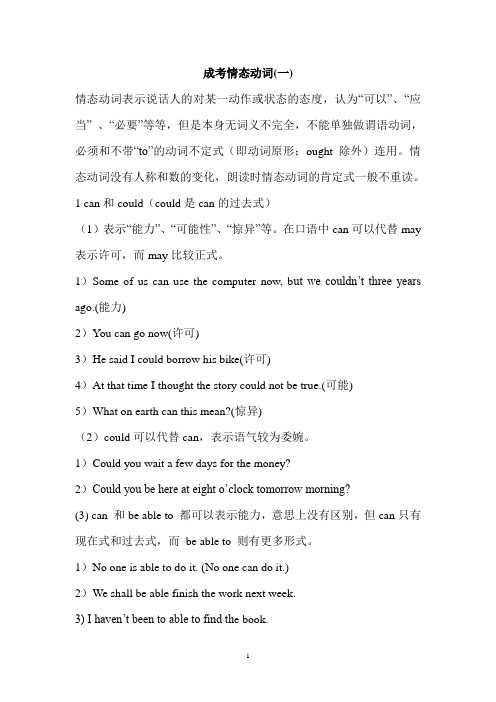
成考情态动词(一)情态动词表示说话人的对某一动作或状态的态度,认为“可以”、“应当” 、“必要”等等,但是本身无词义不完全,不能单独做谓语动词,必须和不带“to”的动词不定式(即动词原形;ought除外)连用。
情态动词没有人称和数的变化,朗读时情态动词的肯定式一般不重读。
1 can和could(could是can的过去式)(1)表示“能力”、“可能性”、“惊异”等。
在口语中can可以代替may 表示许可,而may比较正式。
1)Some of us can use the computer now, b ut we couldn’t three years ago.(能力)2)You can go now(许可)3)He said I could borrow his bike(许可)4)At that time I thought the story could not be true.(可能)5)What on earth can this mean?(惊异)(2)could可以代替can,表示语气较为委婉。
1)Could you wait a few days for the money?2)Could you be here at eight o’clock tomorrow morning?(3) can 和be able to 都可以表示能力,意思上没有区别,但can只有现在式和过去式,而be able to 则有更多形式。
1)No one is able to do it. (No one can do it.)2)We shall be able finish the work next week.3) I haven’t been to able to find th e book.2 may和might(might 是may的过去式)(1)表示允许或征询对方许可,有“可以”的意思。
高中英语情态动词详细讲解及例句
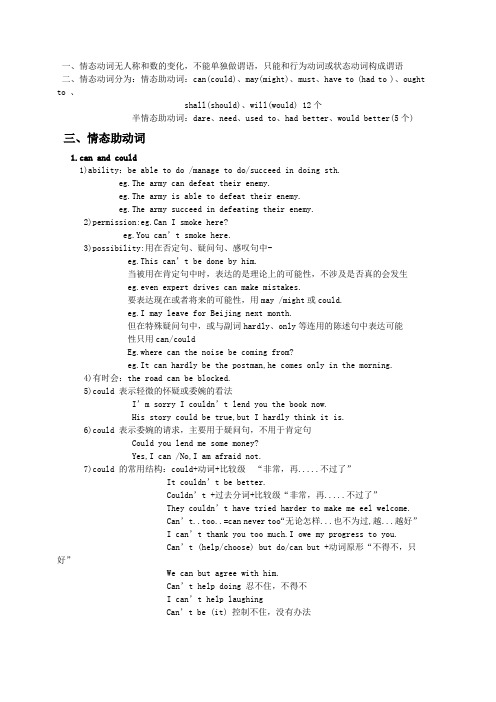
一、情态动词无人称和数的变化,不能单独做谓语,只能和行为动词或状态动词构成谓语二、情态动词分为:情态助动词:can(could)、may(might)、must、have to (had to )、oughtto 、shall(should)、will(would) 12个半情态助动词:dare、need、used to、had better、would better(5个)三、情态助动词1.can and could1)ability:be able to do /manage to do/succeed in doing sth.eg.The army can defeat their enemy.eg.The army is able to defeat their enemy.eg.The army succeed in defeating their enemy.2)permission:eg.Can I smoke here?eg.You can’t smoke here.3)possibility:用在否定句、疑问句、感叹句中-eg.This can’t be done by him.当被用在肯定句中时,表达的是理论上的可能性,不涉及是否真的会发生eg.even expert drives can make mistakes.要表达现在或者将来的可能性,用may /might或could.eg.I may leave for Beijing next month.但在特殊疑问句中,或与副词hardly、only等连用的陈述句中表达可能性只用can/couldEg.where can the noise be coming from?eg.It can hardly be the postman,he comes only in the morning.4)有时会:the road can be blocked.5)could 表示轻微的怀疑或委婉的看法I’m sorry I couldn’t lend you the book now.His story could be true,but I hardly think it is.6)could 表示委婉的请求,主要用于疑问句,不用于肯定句Could you lend me some money?Yes,I can /No,I am afraid not.7)could 的常用结构:could+动词+比较级“非常,再.....不过了”It couldn’t be better.Couldn’t +过去分词+比较级“非常,再.....不过了”They couldn’t have tried harder to make me eel welcome.Can’t..too..=can never too“无论怎样...也不为过,越...越好”I can’t thank you too much.I owe my progress to you.Can’t (help/choose) but do/can but +动词原形“不得不,只好”We can but agree with him.Can’t help doing 忍不住,不得不I can’t help laughingCan’t be (it) 控制不住,没有办法It can’t be helpedCan’t....without 没有...就不能One can’t succeed without perseverance.2.may and might1)permission:May I use your pen?Yes,you may./No,you may not.2)Possibility:用于推测,表示不确定,不用于疑问句中She may know Tom’s address.出现I’m afraid.I’m not sure等表示不确定时,常用may/might.I’m afraid he might not come to attend the meeting today.从语气上判断,may表示的可能性比might 大,might更多的表示怀疑He may be very busy now.He might be very busy now.3)用于让步状语从句中However hard you may study,you cannot master English in a month.4)用于祈使句,表示祝愿May you succeed!5)might 常用于表示轻微的责备和委婉的请求You might post the letter for me if you are going near a post box.You might have let me know before!6)习惯用法:may as well do”理所当然,有足够的理由”She may be proud of her sonMay /might (just) as well do=had better do(最好)You might as well stay at home tonight.May/might as well+do A+as+do+B”与其做B不如做A”You might as well throw the money away as lend it to him.One may as well not know a thing at all as know it but imperfectly 3.must and have to1)表示义务,一定要,必须You must arrive in good time.The meeting is very important.2)表示肯定性或难以避免,必然会,肯定会All men must die.3)must 表示有把握的推测,一定是,准时Must do/must be doing/must have doneThe tall fellow must be a basketball player.Let’s have something.You must be starving.He must have received mu letter which has mailed last week.4)must 表示非要,偏要,常以第二人称为主语,意指不耐或令人不愉快的事情,用于其他人称,表示主语固执,意为偏偏Why must you buy that car?Jane was never a pleasant young girl.After you gave her your advice,she must goand do the opposite.5)must 的三种否定形式表示不可能 must be --can’t be must have done--can’t have done You must have met him before.You can’t have met him before.表示不必 must do--need not to/don’t have toWe must get up at six tomorrow morning.We don’t have to get up at six tomorrow morning.表示决不能,严禁 must--mustn’tYou mustn’t park your car here.6)回答以must提问的句子Must we clean all the rooms?Yes ,you must/No ,you don’t have to/No ,you needn’t7)must 可做名词,表示必须有的东西,必须做的事Warm clothes are a must in the mountains.8)must和have to 表示必须时,有一下差别Must 表示的是说话人主观的看法,而have to则往往强调客观需要The play is not interesting ,I really must go now.I have to work when I was your age.Must 一般只表现在,have to 则有更多的时态。
常见的情态动词及其用法
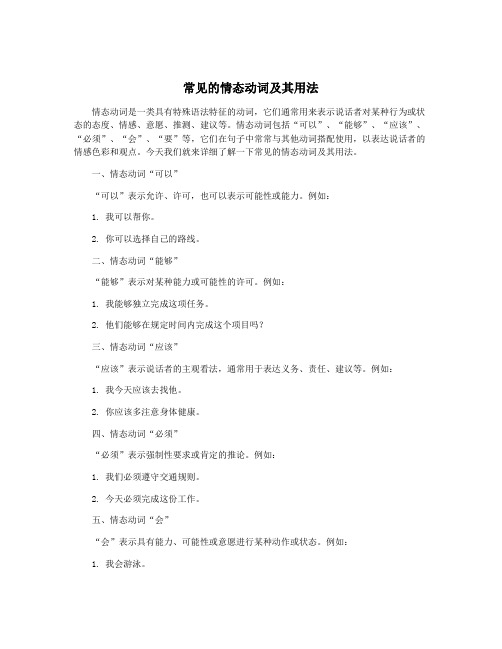
常见的情态动词及其用法情态动词是一类具有特殊语法特征的动词,它们通常用来表示说话者对某种行为或状态的态度、情感、意愿、推测、建议等。
情态动词包括“可以”、“能够”、“应该”、“必须”、“会”、“要”等,它们在句子中常常与其他动词搭配使用,以表达说话者的情感色彩和观点。
今天我们就来详细了解一下常见的情态动词及其用法。
一、情态动词“可以”“可以”表示允许、许可,也可以表示可能性或能力。
例如:1. 我可以帮你。
2. 你可以选择自己的路线。
二、情态动词“能够”“能够”表示对某种能力或可能性的许可。
例如:1. 我能够独立完成这项任务。
2. 他们能够在规定时间内完成这个项目吗?三、情态动词“应该”“应该”表示说话者的主观看法,通常用于表达义务、责任、建议等。
例如:1. 我今天应该去找他。
2. 你应该多注意身体健康。
四、情态动词“必须”“必须”表示强制性要求或肯定的推论。
例如:1. 我们必须遵守交通规则。
2. 今天必须完成这份工作。
五、情态动词“会”“会”表示具有能力、可能性或意愿进行某种动作或状态。
例如:1. 我会游泳。
2. 他会来参加我们的聚会吗?六、情态动词“要”“要”表示必要性、命令、意图等。
例如:1. 你要抓紧时间复习。
2. 他要去超市买东西。
以上是关于常见的情态动词及其用法的简要介绍,情态动词在日常交流和书面语中都具有重要的作用,掌握好情态动词的用法对于提高语言表达能力至关重要。
希望以上内容能够帮助大家更好地理解情态动词的用法,提高语言表达能力。
中考常考的十个情态动词详细讲解

情态动词有具体的词义,但也同助动词一样,需要与动词原形一起构成句子的谓语,另外情态动词没有人称和数的变化,情态动词后必须跟动词原形。
一. 10个最重要情态动词的用法1. can⑴ 表示能力,一般译为“能、会”,尤其指生来具备的能力。
She can swim fast, but I can’t .她会游泳,但我不会。
⑵ 表示许可,常在口语中。
You can use my dictionary.你可以使用我的词典。
⑶ 表示推测,意为“可能”,常用于否定句和疑问句中,此时can’t译为“不可能”。
Can the news be true?这个消息可能是真的吗?It can’t be our teacher. He is on a visit to the Great Wall.不可能是我们老师。
他正在参观长城呢。
2. could⑴ can的过去式,意为“能、会”,表示过去的能力。
He could write poems when he was 10.他十岁的时候就会写诗。
⑵ could在疑问句中,表示委婉请求的语气,此时could没有过去式的意思。
Could you do me a favour?你可以帮我一个忙吗?—Could I use your pen? 我可以使用你的钢笔吗?—Yes, you can.(注意回答)可以。
3. may⑴ 表示请求、许可,比can正式,May I borrow your bike?我可以借用你的自行车吗?You may go home now.你现在可以回家了。
⑵ 表示推测,谈论可能性,意为“可能,或许”,一般用于肯定句中。
It may rain tomorrow .明天可能会下雨。
⑶ may的过去式为 might。
might 也可以表示可能性低于may(此时might没有过去式的意思)。
He is away from school. He might be sick.他离开学校了。
初中英语情态动词讲解

情态动词(一)情态动词的定义: 情态动词表示说话人对某一动作或状态的态度。
(二)情态动词的特点1. 情态动词有一定的词义。
2. 情态动词不能单独做谓语,它必须和其他动词的原形一起构成谓语。
3. 情态动词没有人称,数的变化。
(三)情态动词的结构和意义1.情态动词的基本句型肯定句:主语+情态动词+动词原形+......否定句:主语+情态动词+not+动词原形+......疑问句:情态动词+主语+动词2. 情态动词的意义must“必须”;can/could“能,会”;may/might “可以”;should“应该”;would“愿,要”;have to“不得不”;need“需要”used to do 过去常常做.... Had better do sth 做好做某事(四)情态动词的基本用法1.can (could主要指过去时间)1)肯定句中,表示人或物本身所具有的能力,意为“能,能够,会” :Two eyes can see more than one. / I can swim very well.2)否定和疑问句中,表示可能(理论上或是逻辑判断,could 比can的可能性更小)He can’t (couldn’t) have enough money for a new car.Could it be Henry ?3)疑问中,表示请求、允许:(could表示比can的语气更委婉客气)--Can (Could) you lend me a hand? 帮我一把好吗?2. may (might)1)疑问句中,表允许,或者征求意见。
(might既指过去时间,也可指现在时间,语气比may更委婉)。
在回答May / (Might) /can ( could )I .....? 肯定回答一般用:yes ,you may /can , 或Yes, please. / Certainly./Sure./Of course. ;否定回答:用:No ,you may not / No ,you can’t / No ,you must not(mustn’t)(禁止)/ No, you had better not(最好别)2)肯定句中,may表可能, 但可能性不如can肯定,(might既可以指过去时间,也可以指现在时间,但语气上不如may 肯定)。
情态动词讲解

--- Yes, you may. /Yes, please. (No, you mustn’t.) ’
2. 表示可能性。 意为“或许,可能” 常用于肯定句或否 表示可能性。 意为“或许,可能” 定句中。 可能性小。 定句中。might 比 may 可能性小。 1) They may/might be in the library now. 2) She may not know the truth. (或许不,可能不) 或许不,可能不 或许不 3) She may/might have gone home.
5. — Could I borrow your dictionary? C — Yes, of course you _______. A. might B. will C. can D. should
6. — Might I watch TV after supper? A — Yes, you ________. A. may B. must C. might D. could
3. 表示成功地做了某事时,只能 表示成功地做了某事时,只能was/were able to, 不 , 能用could。 能用 。
was able to He ________ flee Europe before the war broke out.
may 与might
1. 表示“许可”或“请求”,有“可以”的意思,比can 表示“许可” 请求” 可以”的意思, 正式。 正式。 表示委婉语气。 口语中常用 might 代 may ,表示委婉语气。 表示委婉语气 否定回答时常用“ 否定回答时常用“must not”表“禁止,阻止”。 表 禁止,阻止” 1) --- May/Might I watch TV after supper?
情态动词,4种分类,5种句法特征,8中常见用法

情态动词,4种分类,5种句法特征,8中常见用法什么是情态动词呐,他是一种本身有一定的词义,表示说话人的情绪、态度或与语气的动词,但不能单独作谓语,只能和其他动词原形构成谓语。
无人称和数的变化,情态动词后面跟的动词需用原形,否定式构成是在情态动词后面加“not。
”个别情态动词有现在式和过去式两种形式,过去式用来表达更加客气,委婉的语气,时态性不强,可用于过去,现在或将来。
情态动词属非及物动词,故没有被动语态。
情态动词到底如何,下面为大家一一讲解:首先,我们来学习情态动词有那四类:①只做情态动词:must, can(could),may(might) .................②可做情态动词又可做实义动词:need, dare③具有情态动词特征:have(had, has) to, used to④情态动词表猜测注:mustnt代表强烈禁止must表示主观,have to表示客观。
常用的有:can may could must have use .接着,我们学习情态动词特点:情态动词无人称和数的变化,情态动词后面跟的动词须用原形,否定式构成是在情态动词后面加not。
个别情态动词有现在式和过去式两种形式,过去式用来表达更加客气, 委婉的语气,时态性不强,可用于过去,现在或将来。
情态动词属非及物动词,故没有被动语态。
He could be here soo n.他很快就来。
We cant carry the heavy box.我们搬不动那箱子。
Im sorry I cant help you.对不起,我帮不上你。
基本助动词与情态助动词最主要的区别之一是:基本助动词本身没有词义,而情态助动词则有自己的词义,能表示说话人对有关动作或状态的看法,或表示主观设想:What have you been doing since? (构成完成进行体,本身无词义)I am afraid I must be going. (一定要)You may have read some account of the matter.(或许已经)除此之外,情态助动词还有如下词法和句法特征:1)除ought和used以外,其他情态动词后面只能接不带to的不定式。
情态动词讲解

情态动词讲解情态动词讲解情态动词是英语中常用的动词,它可以表示说话者对所说内容的态度、看法或程度等。
它在句子中多占第一位,后才接动词的原形。
情态动词也叫条件动词,它主要包括can,could,may,might,shall,should,will,would,must等。
一、cancan 可以表示“能够,会”的意思,表示能力,而且是推测性的能力。
另外,can还有“允许,请求”的意思。
常见的句型有:1)Can you come with me? 你能和我一起来吗?2)Can you answer this question? 你能回答这个问题吗?3)He can speak three languages. 他会说三种语言。
二、couldcould 表示能力,表示过去的能力,表示推测性的语气。
常见的句型有:1)Could you help me? 你可以帮助我吗?2)Could you tell me your name? 你可以告诉我你的名字吗? 3)She could speak two languages when she was five. 五岁时,她会说两种语言。
三、maymay 表示允许,许可,也可以表示可能,推测性的可能。
常见的句型有:1) May I come in? 我可以进来吗?2)May I go outside? 我可以出去吗?3)It may rain tonight. 今晚可能会下雨。
四、mightmight 可以表示可能,推测性的可能,它比may更加虚弱。
常见的句型有:1)He might come here tomorrow. 明天他可能会来这里。
2)The weather might change tomorrow. 明天天气可能会变化。
3)Might I help you? 我可以帮助你吗?五、shallshall 可以表示建议,也可以表示未来的时间。
它的用法和will 有一定的相似之处,但是它比will更正式,也比will更加强调客观事实。
情态动词详细讲解

情态动词, 不论是第三人称单数,还是人称代词主格,宾格,一律用动词原形。
情态动词有can (could), may (might), must, have to, shall (should, will (would), dare (dared), need (needed), ought to等。
情态动词无人称和数的变化;不能单独使用,必须与其后的动词原形构成谓语。
一、can, could1) 表示能力(体力、知识、技能)。
此时可用be able to代替。
●Can you lift this heavy box?●Mary can speak three languages.●Can you skate?Can只有一般现在时和一般过去式;而be able to则有更多的时态。
I'll not be able to come this afternoon.当表示“经过努力才得以做成功某事”时应用be able to,不能用Can。
如:He was able to go to the party yesterday evening in spite of the heavy rain. 2) 表示请求和允许。
-----Can I go now?----- Yes, you can. / No, you can't.此时可与may互换。
在疑问句中还可用could,might代替,不是过去式,只是语气更委婉,不能用于肯定句和答语中。
---- Could I come to see you tomorrow?---- Yes, you can. ( No, I'm afraid not. )3) 表示客观可能性(客观原因形成的能力)。
They've changed the timetable, so we can go by bus instead.This hall can hold 500 people at least.4) 表示推测(惊讶、怀疑、不相信的态度),用于疑问句、否定句和感叹句中。
常见情态动词讲解
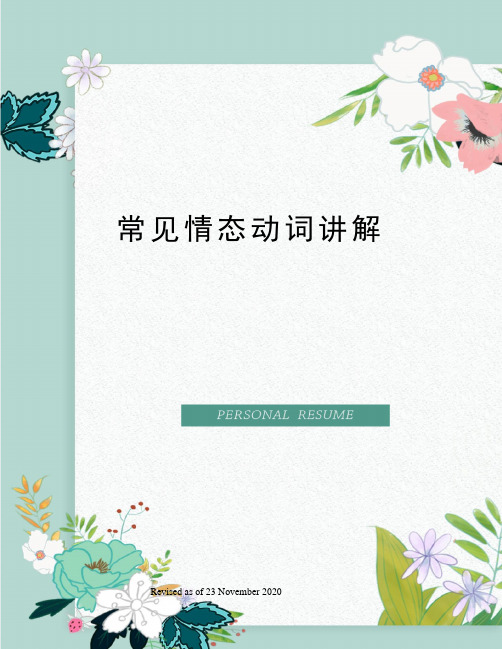
常见情态动词讲解 Revised as of 23 November 2020常见情态动词讲解一、情态动词的定义:情态动词有词义,但它不能单独作谓语,它必须和其他动词一起构成谓语。
情态动词没有人称和数的变化;它的后面必须跟动词原形。
二、情态动词的种类:三、情态动词的用法及主要句型:1、Can I help you ——Yes, please. / No, thanks.2、Can + 主语 + 动词原形 Yes, ~ can. No, ~can’t.3、Can I borrow your book----Yes,of course.4、Can I write on the book ------No, you can’t\mustn’t.5、Could \Can you help me---- Yes,of course.\Certainly.\ Sure.6、Could \Can you tell me the way to the Zoo7、May I come in ----- Come in, please.8、May I sit here----- Yes, please.\Sorry, please don’t.9、May I have some Coke---- Yes, of course.10、May/ Could / Can I speak to Tom -----Speaking. Who’s calling11、should 、shouldn’t 表示劝告:1) He should get up early.2) She shouldn’t play computer game too much.12、Should +主语 +动词原形 Yes, ~ should.\ No, ~shouldn’t.13、表示建议“你愿意…吗”---Would you like to go shopping with me---Yes, I’d love to. /I’d love to. But I’m busy now.14、就餐用语Would you like something to eat\drink ----Yes, I’d like…15、shall用于第一人称(I, we), 可以表示“将”和表示建议“……好吗”1) Where shall we have dinner2) Shall we go fishing -----All right. \OK. \Good idea.16、Must + 主语 + 动词原形 ---Yes,~ must.\No, ~needn’t.四.常见情态动词的区别:1. can (could)1)表示能力,could主要指过去时间。
(完整版)高考情态动词讲解

语法专题(三)情态动词考点归纳考点一:情态动词表示能力1.表现在的或一般的能力:表示现在的或一般的能力用can或be able to,can 比be able to 使用得更普遍。
can 侧重指有能力做某事;而be able to更强调通过努力、克服困难做成某事。
A computer can't think for itself ;it must be told what to do.He is a native speaker of English,so he can of course speak English quite well.2.表示将来的能力:表示将来能力用will be able to。
If you have a good sleep,you will be able to work out this problem.如果你睡个好觉,你就能做出这道题。
3.表示过去的能力:could 表示过去一般的能力,即不表示做或未做某事;而was (were) able to do则表示过去有能力并且成功地做了某事,相当于managed to do something/succeeded in doing somethin。
g考点二:情态动词表示推测(可能性)可能性可分为客观的(理论的)可能性和具体事情实际发生的可能性。
1.客观的(理论的)可能性指并不涉及具体某事是否会发生,此种用法常常可以说明人或事物的特征。
can 用于肯定句中表示客观的(理论的)可能性,can用于疑问及否定句中则表示实际发生的可能性。
The World Wide Web is sometimes jokingly called the World Wide Wait because it can be very slow.A left- luggage office is a place where bags can be left for a short time,especially in a railway station.2.表示具体事情实际发生的可能性:表示具体事情实际发生的可能性的这些词后接动词原形是对现在事情的推测,后接完成式则表示对过去事情的推测;其中can,may/might,should,ought to,must 有时还可接进行时表示对现在正在进行的事情的推测。
情态动词(Model Verbs)讲解
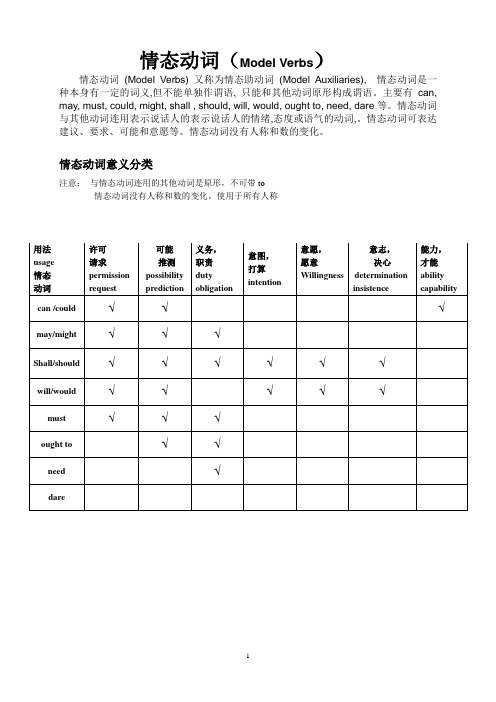
情态动词(Model Verbs)情态动词(Model Verbs) 又称为情态助动词(Model Auxiliaries), 情态动词是一种本身有一定的词义,但不能单独作谓语, 只能和其他动词原形构成谓语。
主要有can, may, must, could, might, shall , should, will, would, ought to, need, dare等。
情态动词与其他动词连用表示说话人的表示说话人的情绪,态度或语气的动词,。
情态动词可表达建议、要求、可能和意愿等。
情态动词没有人称和数的变化。
情态动词意义分类注意:与情态动词连用的其他动词是原形,不可带to情态动词没有人称和数的变化,使用于所有人称一.can 和could 的用法:1.表示:能力ability and capacity 意“能够”表示人或动物的内在能力即有某种知识或者技能而能够做某事。
有时可以和be ableto互换。
He can swim across the river ( He is able to swim across the river)Can she speak English ? ( Is she able to ----)He hurt his foot and couldn't (wasn't able to) play football. 他脚受了伤,所以他不能踢足球了。
can 和be able to 的区别:(1)表示能够时,can只能用在现在时(can)和(could)过去时。
而be able to 可用于各种时态The baby will be able to walk next month 将来时,不能用I hope to be able to see her again 不定式,不用(2)be able to暗指做成了某一事情。
(manage to)Because he worked hard, he was able to pass his examination. 因为他努力工作,所以他能及格。
unit 10情态动词讲解
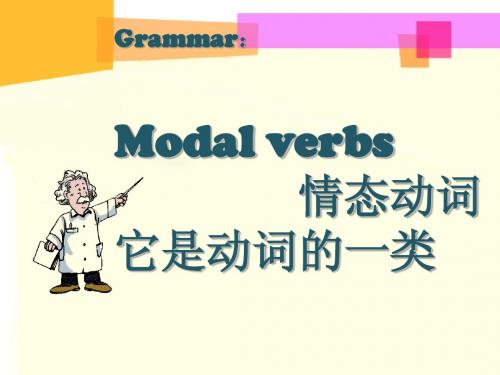
will(would)的用法
1.表示意愿,will表示现在,would表示过去 I will take it. He wouldn‘t come yesterday. 2. 表示征求意见和提出请求 Will you pass me the paper? Would you please pick me up at four?
情态动词只能和实义动词原形一起构成谓语。有 can / may / should / must / have to / shall/ had better 等。 I can’t let you go now. / You must tell me everything.
4 auxiliary verbs 助动词
相关词组
• would like表示愿意 I would like to have a word with you. 我想同你说句话。
• would rather…than…宁愿……也不愿…… I would rather fail than cheat in the examination. 我宁愿考不及格,也不愿意考试作弊。
2 linking verbs 连系动词(主系表结构)
在句中与表语一起构成谓语。
get / grow
be / look / seem / feel / become / taste / smell /
He is a kind old man. / They get angry.
3 modal verb 情态动词
2.由need引出的一般疑问句,肯定回 答常用must或have to;否定答语常用 needn't. 如:
—Need I answer the question? 我需要回答那个问
情态动词知识讲解

情态动词【概念引入】1)情态动词表示说话人对所做动作的观点或态度。
如:需要、可能、意愿、怀疑等。
例如:I must go now.我现在必须得走了。
2)情态动词一般没有人称和数的变化,但是个别情态动词有时态的变化。
例如:can 的过去式是could。
3)情态动词不能单独作谓语,后接动词原形共同做谓语。
例如:I can swim我会游泳。
4)常见的情态动词有:can, may, must, have to, should, would 等。
5)情态动词一般不止一个意思,它的否定式是在情态动词的后面加not,一般疑问句是将情态动词提到句首。
例如:lean ' t speak Frer我不会说法语。
Can you speak Englis?h 你会说英语吗?【用法讲解】1.can 的用法。
1)表能力We can do our homework by ourselves我们可以自己完成作业。
He can swim well他游泳很好。
I can play football but I can ' t p我会踢足球但是我不会弹钢琴。
2)表xxYou can watch TV after supper S 饭后你可以看电视。
You can ' t play basketball in the stre你不能在街上打篮球。
3)表请求Can you help me with my math?尔能帮我学数学吗?Could you lend your book to me?尔能把你的书借给我吗?注意:could 是can 的过去式,但是这里并不表示过去时,而是表示委婉语气。
拓展:can 和be able to 的区别(1)情态动词can只有两种时态形式,现在式can和过去式could,而be able to 有多种时态形式。
在一般过去时中都表示能够时,两者可以互换。
例如:Mary can play the piano.(—般现在时)xx 会弹钢琴。
情态动词讲解分析(全)
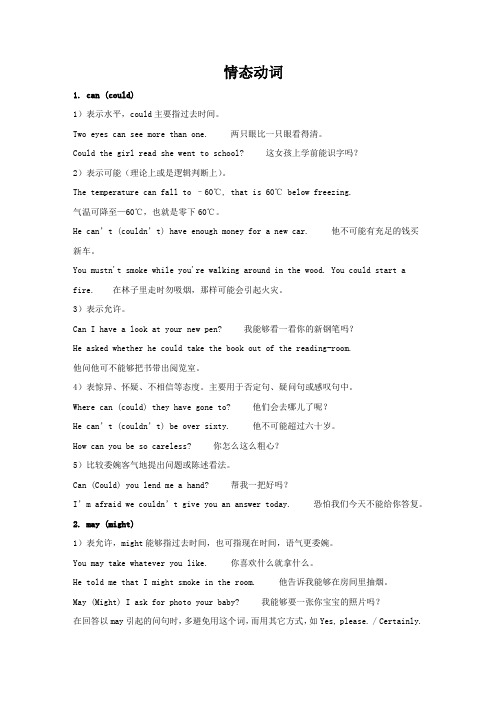
情态动词1. can (could)1)表示水平,could主要指过去时间。
Two eyes can see more than one. 两只眼比一只眼看得清。
Could the girl read she went to school? 这女孩上学前能识字吗?2)表示可能(理论上或是逻辑判断上)。
The temperature can fall to –60℃, that is 60℃ below freezing.气温可降至—60℃,也就是零下60℃。
He can’t (couldn’t) have enough money for a new car. 他不可能有充足的钱买新车。
You mustn't smoke while you're walking around in the wood. You could start a fire. 在林子里走时勿吸烟,那样可能会引起火灾。
3)表示允许。
Can I have a look at your new pen? 我能够看一看你的新钢笔吗?He asked whether he could take the book out of the reading-room.他问他可不能够把书带出阅览室。
4)表惊异、怀疑、不相信等态度。
主要用于否定句、疑问句或感叹句中。
Where can (could) they have gone to? 他们会去哪儿了呢?He can’t (couldn’t) be over sixty. 他不可能超过六十岁。
How can you be so careless? 你怎么这么粗心?5)比较委婉客气地提出问题或陈述看法。
Can (Could) you lend me a hand? 帮我一把好吗?I’m afraid we couldn’t give you an answer today. 恐怕我们今天不能给你答复。
小学五年级关键知识归纳情态动词的用法与含义
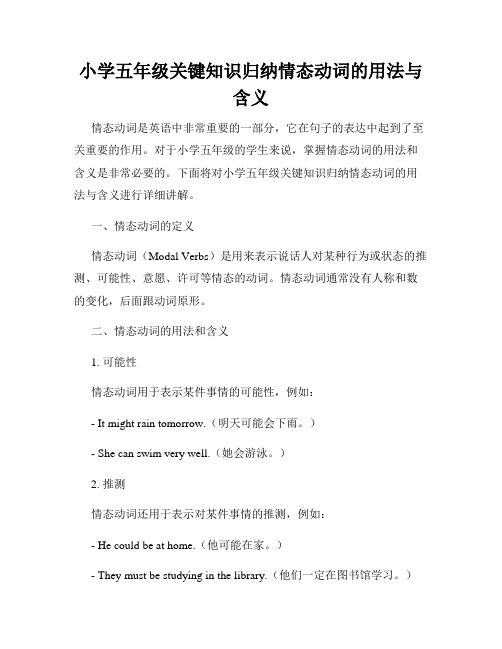
小学五年级关键知识归纳情态动词的用法与含义情态动词是英语中非常重要的一部分,它在句子的表达中起到了至关重要的作用。
对于小学五年级的学生来说,掌握情态动词的用法和含义是非常必要的。
下面将对小学五年级关键知识归纳情态动词的用法与含义进行详细讲解。
一、情态动词的定义情态动词(Modal Verbs)是用来表示说话人对某种行为或状态的推测、可能性、意愿、许可等情态的动词。
情态动词通常没有人称和数的变化,后面跟动词原形。
二、情态动词的用法和含义1. 可能性情态动词用于表示某件事情的可能性,例如:- It might rain tomorrow.(明天可能会下雨。
)- She can swim very well.(她会游泳。
)2. 推测情态动词还用于表示对某件事情的推测,例如:- He could be at home.(他可能在家。
)- They must be studying in the library.(他们一定在图书馆学习。
)3. 动作的能力、习惯情态动词也可以表示一个人的能力或者习惯,例如:- I can play the piano.(我会弹钢琴。
)- She could run very fast when she was young.(她年轻时跑得很快。
)4. 请求、建议和命令情态动词还可以用来表示请求、建议和命令等情态,例如:- Can you pass me the salt, please?(请你把盐递给我好吗?)- You should finish your homework before watching TV.(看电视之前你应该完成作业。
)5. 允许和禁止情态动词还可以表示允许和禁止的意思,例如:- May I go to the bathroom?(我可以去洗手间吗?)- You must not smoke here.(你不可以在这里吸烟。
)6. 必要性和可能性情态动词还可以表示某件事情的必要性和可能性,例如:- You should study hard to get good grades.(你应该努力学习以获取好成绩。
情态动词讲解(简)

情态动词讲解部分一、情态动词的语法特征1)情态动词不能表示正在发生或已经发生的事情,只表示期待或估计某事的发生。
2)情态动词除ought 和have 外,后面只能接不带to 的不定式。
3)情态动词没有人称,数的变化,即情态动词第三人称单数不加-s。
4)情态动词没有非谓语形式,即没有不定式,分词,等形式。
二、情态动词用法详解1、can/could 和be able to1)can/could 表示能力;可能(过去时用could), 只用于现在式和过去式(could)。
be able to可以用于各种时态。
They will be able to tell you the news soon. 他很快就能告诉你消息了。
2)只用be able to的情况:a. 位于助动词后。
b. 情态动词后。
c. 表示过去某时刻动作时。
d. 用于句首表示条件。
e. 表示成功地做了某事时,用was/were able to,不能用could。
注意:could有时不表示时态(1)提出委婉的请求,(注意在回答中不可用could)。
(2)在否定句、疑问句中表示推测或怀疑。
3)当主语是无行为能力的名词时,在肯定句中的can 表示“有时候会……”“偶尔会……”:2、may和might1)表示允许或请求;表示没有把握的推测;注意:might 表示推测时,不表示时态,只是可能性比may 小。
2)成语:may/might as well,后面接不带to 的不定式,意为"不妨"。
3)may 放在句首,表示祝愿。
3、must和have to1)两词都是'必须'的意思,have to 表示客观的需要,must 表示说话人主观上的看法,既主观上的必要。
2)have to有人称、数、时态的变化,而must只有一种形式。
但must 可用于间接引语中表示过去的必要或义务。
3)否定结构中:don't have to表示"不必",mustn't表示"禁止"。
- 1、下载文档前请自行甄别文档内容的完整性,平台不提供额外的编辑、内容补充、找答案等附加服务。
- 2、"仅部分预览"的文档,不可在线预览部分如存在完整性等问题,可反馈申请退款(可完整预览的文档不适用该条件!)。
- 3、如文档侵犯您的权益,请联系客服反馈,我们会尽快为您处理(人工客服工作时间:9:00-18:30)。
情态动词情态动词表示说话人对动作或状态的各种观点和态度,如需要、猜测、意愿或怀疑等。
情态动词有词义,但不完全,是所谓的“辅助性”动词,在句中不能单独充当谓语。
一、情态动词的特征和形式A.情态动词的各种形式如下:情态动词may、might 、can、could、must、have to、ought to、will/ would、shall/should、need、dare、used to否定式may not、might not、can not 、could not、must not、do not have to、ought not to、will not、would not、shall not、should not、need not、dare not、used not to、did not use to简略否定式mayn't(老式英语,现在不常见)、mightn't、can't、couldn't、mustn't、don't have to、oughtn't to(否定句中to可省略)、won't、wouldn't、shan't(只用于英国英语)shouldn't、needn't、daren't、usedn't to、didn't use toB.情态动词除ought to, used to等外,后面只接不带to的不定式。
1.情态动词+doYou shouldn't be so careless.你不该这样粗心大意。
Jessica told him yesterday she might not go on the trip.杰西卡昨天告诉他,她可能不去旅行了。
Difficulties can and must be overcome.困难能够而且必须克服。
2.情态动词+be doingShe must be listening to pop music.她肯定在听流行音乐。
You should be reviewing your lessons.你应该在复习功课。
My mother may/might be cooking now.我妈妈可能正在做饭。
3.情态动词+have doneThey might have visited the Great Wall.他们可能参观过长城了。
He must have got up very early to catch the train.他一定起得很早去赶火车了。
You ought to have come earlier.你本该早一点儿来。
4.情态动词+be doneThis word can also be used as a verb.这个词也可以用作动词。
Something must be done to stop pollution.必须采取措施来制止污染。
The work ought to have been finished long ago.这工作早就该完成了。
C.情态动词第三人称单数一般现在时没有词形变化。
You ought to wear a raincoat.你应该穿件雨衣。
She ought to wear a raincoat. 她应该穿件雨衣。
Plants must have oxygen in order to live.为了存活植物必须有氧气。
A plant must have oxygen in order to live.为了存活植物必须有氧气。
D.情态动词的时态并不是区分时间的主要标志。
在一些场合中,情态动词的现在式和过去式都可以表示现在时间、过去时间或将来时间。
I'm afraid it might rain tonight.我看今晚可能要下雨。
Could I borrow your thermos ['θə:mɔs]我可以借用你的暖水瓶吗?It's a nice day today. We could go for a walk.今天天气不错,我们可以出去散散步。
E.情态动词是互相排斥的,一般不允许两个意义相近的情态动词连用。
【误】Soldiers must have to obey orders.【正】Soldiers have to obey orders.军人必须服从命令。
【正】Soldiers must obey orders.军人必须服从命令。
【误】Can I be able to borrow two books at a time【正】Can I borrow two books at a time我能一次借两本书吗?【正】Will I be able to borrow two books at a time我能一次借两本书吗?一、情态动词的意义和用法A. may和might1.表示请求、许可,常译为“可以”。
在口语中可用can, could代替may,但在正式场合用may。
表示允许时,也可用might 代替,might不表示过去时,而是表示口气比较婉转。
You may take this seat if you like.如果你喜欢可以坐这个位置。
May/Can/ Could /Might I have a talk with you我可以和你谈谈吗?--- May/Might I come into the room to see my mother我可以进房间看我母亲--- No, you mustn't. She needs to have a good rest.不.你不能进.她需要好好休息。
提示:May I ...问句常见的肯定回答和否定回答。
肯定回答Yes, please. / Certainly / Yes, of course. / Sure. /Go ahead, please.否定回答No, you can't.(最常见)/ No, you mustn't.(具有强烈禁止的意思)Please don't. /You'd better not./I don't think you can./I'm sorry it's not allowed. 2.表示推测,可译为“可能,也许”。
Your math teacher may/might be in his office. 你们的数学老师可能在办公室里。
(一般情况下,might表示的可能性很小)The light isn't on. It may/might be broken.那盏灯没有亮,它可能坏了。
There may /might be some ink left in the bottle.瓶子里也许还剩点儿墨水。
注意:用may表示推测一般不用于疑问句,在疑问句中通常用can来代替。
Can he be at home. 他可能在家吗?--- Can it be true这可能是真的吗?--- It may be, or may not be.可能是,也可能不是。
3.用在目的状语从句中,构成谓语。
He wants to take a taxi so that he may get there in time.他想坐出租车,这样他就能及时到达那里。
I arrived at the airport earlier in order that I might meet him.我早早地就到了机场为了能接到他。
4.有时可以用于祈使句表示祝愿。
May you succeed.祝你成功/May you be happy.祝你快乐。
May that day come soon.希望这一天早日到来。
B. can和could1.表示能力,可译为“能,会”。
I can swim.我会游泳。
Emily can dance well and her mother could dance well when she was young.艾米丽舞跳得很好,她妈妈年轻时舞跳得也很好。
The cinema can seat 1,000 people.这电影院能容纳1,000人。
I could not read such an easy book when I was 7 years old.我七岁时连如此简单的书我也看不懂。
2.表示允许、许可,常用在口语中。
could比can语气上要客气。
--- Could I use your dictionary.我可以用一下你的字典吗?---Yes, go ahead.可以,用吧。
(或Yes, you can.但不能说Yes, you could.)Could/ Can you tell me how to get to the zoo.劳驾,你能告诉我怎么去动物园吗?He asked me whether he could take the book out of the reading room.他问我可不可以把书带出阅览室。
3.表示推测,可用于肯定句(can很少用)、否定句和疑问句,但更常见于疑问句或否定句。
在此种用法中can和could没有时态的区别,只是表示可能性的大小,can表示推测的可能性比could大。
Can he be ill at home?他会是生病在家吗?Can the story be true?这个故事会是真的吗?He cannot be at home.他不可能在家。
You mustn't smoke while you are walking around in the woods. You could start a fire. 在林子里走时一定不要吸烟,那样可能会引起火灾。
4.表示惊异、怀疑、不相信等态度,主要用于否定句和疑问句中。
How can you be so careless?你怎么这么粗心?Where can /could they have gone?他们会去了哪里?He can't/couldn't be over sixty.他不可能超过60岁。
5.Could可以用在虚拟条件句中。
If I could fly, I should be very happy.如果我能飞,我会很高兴。
If you had followed my advice, you could have finished it.如果你当时听我的,你早就做完了。
If you had tried harder, you could have passed your exam.如果你再努力些,你就能通过考试了。
